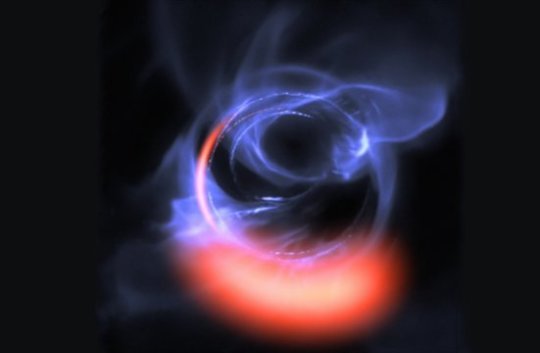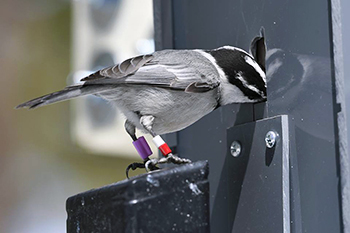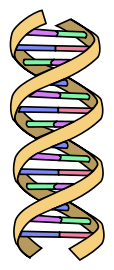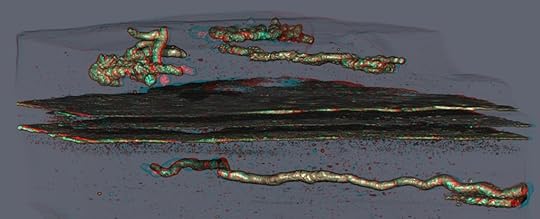Michael J. Behe's Blog, page 524
February 15, 2019
Are black holes partly a philosophy question?

material orbiting a black hole (simulation)/ESO, Gravity Consortium, L. Calçada
The black hole has always occupied a sort of space in the middle, between science and philosophy. It’s good to see that acknowledged. From ScienceDaily:
Erik Curiel studied Philosophy as well as Theoretical Physics at Harvard University and the University of Chicago, and the primary aim of his current DFG-funded research project is to develop a precise philosophical description of certain puzzling aspects of modern physics. “Phenomena such as black holes belong to a realm that is inaccessible to observation and experiment. Work based on the assumption that black holes exist therefore involves a level of speculation that is unusual even for the field of theoretical physics.” However, this difficulty is what makes the physical approach to the nature of black holes so interesting from the philosophical point of view. “The physical perspective on black holes is itself inextricably bound up with philosophical issues relating to ontological, metaphysical and methodological considerations,” says Curiel.
During the preparation of his philosophical analysis of the concept of black holes for Nature Astronomy, the author spoke to physicists involved in a wide range of research fields. In the course of these conversations, he was given quite different definitions of a black hole. Importantly, however, each was used in a self-consistent way within the bounds of the specialist discipline concerned. Curiel himself describes these discussions as “surprising” and “eye-opening.”
For astrophysicist Avi Loeb, “a black hole is the ultimate prison: once you check in, you can never get out.” On the other hand, theoretical physicist Domenico Giulini regards it as “conceptually problematical to think of black holes as objects in space, things that can move and be pushed around.”Paper. (paywall) – Erik Curiel. The many definitions of a black hole. Nature Astronomy, 2019; 3 (1): 27 DOI: 10.1038/s41550-018-0602-1 More.
Follow UD News at Twitter!
See also: Proposed black hole information paradox: They become white holes
Black holes do not behave as string theorists say they should
and
And now, black holes can be ghosts
Copyright © 2019 Uncommon Descent . This Feed is for personal non-commercial use only. If you are not reading this material in your news aggregator, the site you are looking at is guilty of copyright infringement UNLESS EXPLICIT PERMISSION OTHERWISE HAS BEEN GIVEN. Please contact legal@uncommondescent.com so we can take legal action immediately.
Plugin by Taragana
Michael Behe responds to the hit pre-publication review at Science

Which was clearly intended to muddy the waters:
For readers who don’t have time to plow all the way through, here are the take-home lessons:
– gene-level counter-examples cited by the reviewers are shamelessly question-begging; the reviewers simply gesture at genes and assume they were produced and/or integrated into living systems by random processes, but neither the reviewers nor anyone else has even tried to show that is possible;
– organ-level counter-examples cited by the reviewers as produced by exaptive processes are similarly question-begging; criticisms of my earlier books cited by the reviewers were similarly question-begging and/or relied on vague, imaginative stories;
– the reviewers are either unaware of or ignore my many detailed replies to earlier criticisms and to papers the reviewers themselves cite;
– as noted in my previous post, the reviewers don’t even attempt to grapple with the main argument of the book, that beneficial degradative mutations will rapidly, relentlessly, unavoidably, outcompete beneficial constructive mutations at every time and population scale. Michael Behe, “Train Wreck of a Review: A Response to Lenski et al. in Science” at Evolution News and Science Today
The thing is, a great many people are only looking for a half-baked reason to dismiss the book. Swamidass et al. provided them with one.
The fact that the attack is incompetent is its strength, not its weakness. It shows the social power of Darwinism, irrespective of intellectual force. Most Science readers will probably go with social power. It gives them the right to sneer, right or wrong. Intellectual force requires a basis.
Note: Social power is a form of living on capital. When it’s gone, it’s gone.
Follow UD News at Twitter!
See also: Some thoughts on the hatchet review of Behe’s Darwin Devolves in Science One wonders, do many biologists have independent ideas that Darwinism stifles? If so, they must be frustrated by the need to keep them under wraps or defend them from malign mediocrities for whom mere orthodoxy produces a living.
Science Mag’s hit on Michael Behe’s Darwin Devolves avoids his main point In these times, are you better off knowing the problems or innocently citing approved sources of misinformation as your reason for making decisions? You decide.
and
All together now, Dissenters: Happy Birthday, Darwin! Folks, it’s Darwin Day, when we are told by Darwinians to celebrate “intellectual bravery.” Very well, here is some: Dissent from Darwinism, the vid.
Copyright © 2019 Uncommon Descent . This Feed is for personal non-commercial use only. If you are not reading this material in your news aggregator, the site you are looking at is guilty of copyright infringement UNLESS EXPLICIT PERMISSION OTHERWISE HAS BEEN GIVEN. Please contact legal@uncommondescent.com so we can take legal action immediately.
Plugin by Taragana
February 14, 2019
Some thoughts on the hatchet review of Behe’s Darwin Devolves in Science

There’s been so much attention around reviews of Darwin Devolves recently that one wonders if anyone who hasn’t read biochemist Michael Behe’s book already will stop to do so.
In their review in Science, Swamidass et al. are engaged in a carefully crafted strategy. They are creating a situation where average practitioners in a field will “know” that they do not need to take Behe’s criticism of Darwin seriously. After all, a major science news organ addressed to average practitioners allows their sort of attack to pass for a review.
It doesn’t matter whether Swamidass et al. ‘s criticism is justified or not. Most people do not really make decisions by asking such questions. They find out what they need to believe in order to stay in good with the people who reward them and enable their lifestyle. They learn not to notice when what they need to believe doesn’t commend itself on the basis of evidence. Not so long as it works for the purpose of social and professional acceptance. In an increasing number of situations today, whatever top people want us to believe works much better for social and professional purposes than alignment with facts would.
My compatriot Mark Steyn explains here: Noticing and Not Noticing
A population can remain faithful to a system like the Darwinian account of evolution indefinitely, while just “not noticing” the problems. “Noticers” are outliers, after all.
However, such a system is vulnerable to certain types of challenge: For example, if believing and following the system becomes inconsistent with surviving and thriving, the population naturally consider alternatives, despite themselves. At Mind Matters, Bob Marks relates how that happened in Japan after Hiroshima.
One of my uncles was a paratrooper in the Pacific theater. His job was to strap 24 pounds of explosives onto each leg and parachute behind enemy lines when the Allies invaded Japan. Unlike the invasion of Normandy, France, on D-Day, there were no friendly civilians behind enemy lines. Even Japanese women and children were trained to attack the invaders with sticks and pitchforks, and fight to the death. It was a suicide mission. But the atomic bombs dropped on Hiroshima and Nagasaki led to the unconditional surrender of Japan so an armed invasion never happened. More.
Yes, everybody was supposed to fight honorably to the death when the Americans invaded. But what really happened at Hiroshima was so new, so different, so terrible, that Japanese opinion leaders realized (and were able to convince most followers) that the sacrifice was useless. The traditional culture in which suicide attacks might prove something was no longer viable anyway. Countless lives were saved as a result.
Later, Japan began to see that victory wasn’t impossible; it would just look very different from what they had expected. They had to beat the Americans technologically in order to triumph. Patriotic Americans would buy Toyota, not Ford, and defend their choices to their neighbours.
Obviously, that’s an extreme example. But it demonstrates that even very traditional people, loyal to an old order to the death, will accept change if the status quo simply isn’t viable any more and change offers a future.
One wonders, do many biologists have independent ideas that Darwinism stifles? If so, they must be frustrated by the need to keep them under wraps or defend them from malign mediocrities for whom mere orthodoxy produces a living.
Nature is so vast and complex, that I believe that if the right people have been attracted to biology, they will indeed have new ideas worth fighting for, even if they are not yet in a position to admit it. Often, the incident that rallies people in such a case is one no one predicted.
 News at Linked In:
News at Linked In: I think our people should go on recording and interpreting the evidence from nature according to accepted science-based methods, wherever the evidence leads, irrespective of the fashion.
But never underestimate the power of a malign orthodoxy to prevent truth/facts from getting a fair hearing when their own primacy is at risk. All the more viciously if they begin to suspect they might not have all the answers. – O’Leary for News
I am looking forward to reading Behe’s book and several others soon.
Amazon Best Sellers Rank: #1,500 in Books (See Top 100 in Books)
#1 in Books > Christian Books & Bibles > Theology > Creationism #1 in Books > Science & Math > Biological Sciences > Biology > Developmental Biology #3 in Books > Religion & Spirituality > Religious Studies > Science & Religion
See also: Science Mag’s hit on Michael Behe’s Darwin Devolves avoids his main point In these times, are you better off knowing the problems or innocently citing approved sources of misinformation as your reason for making decisions? You decide.
and
All together now, Dissenters: Happy Birthday, Darwin! Folks, it’s Darwin Day, when we are told by Darwinians to celebrate “intellectual bravery.” Very well, here is some: Dissent from Darwinism, the vid.
Copyright © 2019 Uncommon Descent . This Feed is for personal non-commercial use only. If you are not reading this material in your news aggregator, the site you are looking at is guilty of copyright infringement UNLESS EXPLICIT PERMISSION OTHERWISE HAS BEEN GIVEN. Please contact legal@uncommondescent.com so we can take legal action immediately.
Plugin by Taragana
Natural selection at work: Smarter chickadees survive the winter more often
 Here’s an excellent illustration of the power of Darwinian natural selection:
Here’s an excellent illustration of the power of Darwinian natural selection:
Enhanced spatial cognition and brain power evolves via natural selection, an elaborate study of hundreds of mountain chickadees in the Sierra Nevada has found. Using passive integrative transponder (PIT) tags in combination with radio frequency identification-equipped feeders, scientists at the University of Nevada, Reno have tracked feeding behaviors and measured learning and memory of these non-migratory birds that live year-round in the high-elevation forest northwest of Truckee, California.
“This is a unique program, set in the wilderness, so we get unique results,” Vladimir Pravosudov, lead researcher and biology professor at the University’s College of Science, said. “Over the years, we’ve banded and tagged thousands of chickadees and observed their spatial cognition using custom-designed and built feeders that allow us to track how individuals learn and remember. And now we have tested whether individuals with better learning and memory performance are more likely to survive the winter.”…
“Our results provide the first direct evidence for natural selection on spatial cognition in wild food-caching mountain chickadees,” he said. “Taken together, our results suggest that natural selection associated with environmental differences, like those in winter conditions between high and low elevations in the mountains, might be generating intraspecific differences in cognitive abilities. Our evidence suggests that natural selection, rather than some other potential variables that critics have said could be responsible for the results of earlier comparative studies inconclusive, is the main driver of such differences.” Mike Wolterbeek, “Natural selection and spatial memory link shown in mountain chickadee research” at Nevada Today
Good, careful work.
In short, the chickadees with better skills were more likely to survive the winter. None of them evolves to the point where they are enrolled at the local community college. That’s as much as the real Darwinism will get you.
Follow UD News at Twitter!
See also: Taming the silver fox, taming ourselves? Oh, please …
Does the war on cancer reveal limits to random mutation?
and
Natural selection: Could it be the single greatest idea ever invented?
Copyright © 2019 Uncommon Descent . This Feed is for personal non-commercial use only. If you are not reading this material in your news aggregator, the site you are looking at is guilty of copyright infringement UNLESS EXPLICIT PERMISSION OTHERWISE HAS BEEN GIVEN. Please contact legal@uncommondescent.com so we can take legal action immediately.
Plugin by Taragana
Researchers: Cells have a repair crew that fixes local leaks
 The leaks get fixed in a sudden burst of activity that enables rapidly developing embryos (frogs) to just go on developing:
The leaks get fixed in a sudden burst of activity that enables rapidly developing embryos (frogs) to just go on developing:
“We discovered that cells are normally very proactive when it comes to maintaining the barrier,” Stephenson said. “This repair mechanism happens quickly and is carried out very locally, affecting only a small part of the cell junction, rather than multiple cells or the whole tissue.
“We think that this proactive approach is what gives our cells the flexibility to move and change shape without compromising the barrier function of the tissue. Diseases involving a leaky barrier might be due to a faulty repair mechanism or the cells’ inability to detect leaks and flip the switch.”
Stephenson and other members of the Miller Lab are now working to determine how the switch gets flipped to turn on Rho at the right time and place and to identify other proteins that are part of the cellular repair crew to plug leaky biological barriers. – “Rho flares repair local tight junction leaks” Developmental Cell (2019). DOI: 10.1016/j.devcel.2019.01.016 , https://www.cell.com/developmental-ce... (paywall)
University of Michigan, “New live-imaging technique reveals cellular repair crew plugging leaky biological barrier” at Phys.org
Such intricate systems just happen to fall into place in cells via Darwinian evolution even though we know that nothing else happens that way without intelligent direction. Fancy that.
See also: Researchers: How The Immune System “Thinks”
Follow UD News at Twitter!
Researcher: Mathematics Sheds Light On “Unfathomably Complex” Cellular Thinking
How do cells in the body know where they are supposed to be?
Researchers A Kill Cancer Code Is Embedded in Every Cell
How Do Cells Interpret The “Dizzying” Communications Pathways In Multicellular Life Forms?
and
Cell atlases reveal extreme complexity at biology’s frontiers
Copyright © 2019 Uncommon Descent . This Feed is for personal non-commercial use only. If you are not reading this material in your news aggregator, the site you are looking at is guilty of copyright infringement UNLESS EXPLICIT PERMISSION OTHERWISE HAS BEEN GIVEN. Please contact legal@uncommondescent.com so we can take legal action immediately.
Plugin by Taragana
How Neanderthals got the role of The Subhumans

Neanderthal/Photaro
See, in a Darwinian scheme of human origins, somebody has got to be the subhuman. But why the Neanderthals?
Before King’s contribution, the predominant view was that the Neanderthal might be a deformed or diseased human. King dismissed this idea with the suggestion that even the most degraded and “inferior” human races (as King believed races other than Europeans to be) showed a more spherical skull and a higher forehead than the Neanderthal skull cap suggested.
During the 19th century, a high forehead was believed to indicate superior intelligence. Australian Aborigines were most Europeans’ favourite example of a supposedly “degraded” and “savage” race and King believed that even their skulls showed more similarity to modern humans than the Neanderthal skull. In short, the Neanderthal skull’s “strong simial tendencies” led King to believe that it was simply too different from humans to be of the same species. In his 1864 paper for the Quarterly Journal of Science he even proposed in a foonote that “I now feel strongly inclined to believe that it is not only specifically but generically distinct from Man”. That is, not a member of the genus Homo…
It is hard for us to recapture the shock value of King’s ideas in asserting the existence of another species of human-like creatures at a time when the Biblical version of creation was widely considered an accurate description of the Earth’s history.Juliana Adelman, “The Galway professor behind our understanding of Neanderthals” at The Irish Times
The “shock value” of officially scientific concepts of the subhuman was a harbinger of things to come.

Hat tip: Ken Francis, co-author with Theodore Dalrymple, of The Terror of Existence: From Ecclesiastes to Theatre of the Absurd.
See also: The “dumb Neanderthal” myth dies hard
Was Neanderthal man fully human? The role racism played in assessing the evidence
Follow UD News at Twitter!
Bombshell: Neanderthal art found. Why was it a “bombshell?”
In any Darwinian scheme, someone must be the subhuman. Otherwise, there is no beginning to human history.
Neanderthal Man: The long-lost relative turns up again, this time with documents
and
A deep and abiding need for Neanderthals to be stupid. Why?
Copyright © 2019 Uncommon Descent . This Feed is for personal non-commercial use only. If you are not reading this material in your news aggregator, the site you are looking at is guilty of copyright infringement UNLESS EXPLICIT PERMISSION OTHERWISE HAS BEEN GIVEN. Please contact legal@uncommondescent.com so we can take legal action immediately.
Plugin by Taragana
February 13, 2019
At Mind Matters: Could DNA be hacked, like software?

It’s already been done. As a language, DNA can carry malicious messages:
People often say that our genome is like a language. For example, a recent science paper explains that “genomes appear similar to natural language texts, and protein domains can be treated as analogs of words.”1
For that reason, DNA can be used to encode messages …
But in some ways, our genomes are much more powerful than words. They are part of a process that utters not just ideas but living beings. Including human beings, who ourselves have ideas.
In August 2017, researchers announced that they had used DNA to encode malware to hack a computer program that reads genetic sequences:More.
Also at Mind Matters: How a computer programmer looks at DNA And finds it to be “amazing” code
Your phone knows everything now And in a world where no data is anonymous, yours may be sold to the highest bidder
and
The $60 billion-dollar medical data market is coming under scrutiny As a patient, you do not own the data and are not as anonymous as you think
Copyright © 2019 Uncommon Descent . This Feed is for personal non-commercial use only. If you are not reading this material in your news aggregator, the site you are looking at is guilty of copyright infringement UNLESS EXPLICIT PERMISSION OTHERWISE HAS BEEN GIVEN. Please contact legal@uncommondescent.com so we can take legal action immediately.
Plugin by Taragana
“Super-Ancient mobile organisms” push mobile life back to 2.1 billion years ago
 tube-like organisms from 2.1 billion years ago/
tube-like organisms from 2.1 billion years ago/ A. El Albani & A. Mazurier/IC2MP, CNRS/Université de Poitiers
Raising questions about the history of life:
Discovered in rocks in Gabon and dating back approximately 2.1 billion years, the fossils suggest the existence of a cluster of single cells that came together to form a slug-like multicellular organism that moved through the mud in search of a more favourable environment… Previous discoveries dated the earliest traces of locomotion in complex organisms in much younger rocks dated at around 570 million years ago from various localities… The fossils arepreserved as tubular structures running through the rock in thin layers with a consistent diameter of a few millimetres. Located next to these tubular structures were fossilised microbial biofilms which, the researchers believe, acted as grazing grounds for the multicellular organisms. Cardiff University, “Scientists discover oldest evidence of mobility on Earth” at Eurekalert
Paper. (paywall)
Hmmm: “came together to form a slug-like multicellular organism that moved through the mud in search of a more favourable environment… ” And “sluglike?”
Reminds us of the slime molds of today. See, for example, Is an amoeba smarter than your computer? (Yes! In a certain way.)
Some scientists question whether these 17 cm tubes really demonstrate mobility:
“What matters here is their astonishing complexity and diversity in shape and size, and likely in terms of metabolic, developmental and behavioral patterns, including the just-discovered earliest evidence of motility, at least for certain among them,” coauthor Abderrazak El Albani of the University of Poitiers in France tells Reuters…
“I think the case for some biological connection is strong,” Graham Shields of University College London who did not participate in the study tells The Guardian, but rather than a single organism making its way through the rock, the tubes could have resulted from microbial mats or tube-like organisms called Grypania. Jef Akst, “Fossilized Tubes Point to Super-Ancient Mobile Organisms” at The Scientist
We’ll see. Meanwhile, we’ve often heard that there were billions of boring years in the history of life (the Boring Billions). Maybe not so boring. See, for example:
Photosynthesis Pushed Back Even Further. Time To Revisit The “Boring Billion” Claim
Earth’s “boring billion”now hot again (2015)
The “boring billion” years: New hypothesis suggests oxygen shortage stalled life (2014)
Why was there a “boring billion” years of single cell life? (2014)
Follow UD News at Twitter!
Copyright © 2019 Uncommon Descent . This Feed is for personal non-commercial use only. If you are not reading this material in your news aggregator, the site you are looking at is guilty of copyright infringement UNLESS EXPLICIT PERMISSION OTHERWISE HAS BEEN GIVEN. Please contact legal@uncommondescent.com so we can take legal action immediately.
Plugin by Taragana
Darwinian grandmother hypothesis takes another hit
 More to the point, is that Grandma or a wolf?
More to the point, is that Grandma or a wolf?“Evolutionarily,” one might almost say, Darwinism dies hard. It rolls off the tongue of a TED talk type. One can construct any kind of sotry about nature without the benefit of having ever lived with very much of it because it is a laid-on, one-size-fits-all theory. For example, there is the “grandmother” hypothesis, which attempts to account satisfactorily for the fact that kids have grandmas and weasels don’t (At neast not in the emotional sense). Every so often, in a type of event we can only hope will become more frequent, someone actually tests the burble:
The studies are part of a broader effort to explain the existence of menopause, a rarity in the animal kingdom. The so-called “grandmother hypothesis” stipulates that, from an evolution standpoint, women’s longevity is due to their contributions to their grandkids’ survival, thus extending their own lineage (SN: 3/20/04, p. 188)…
In the Finnish study, researchers wanted to know if grandmas eventually age out of that beneficial role. The team used records collected on the country’s churchgoers born from 1731 to 1895, including 5,815 children. Women at that time had large families, averaging almost six children, with about a third of kids dying before age 5. Sujata Gupta, “Evolutionarily, grandmas are good for grandkids — up to a point” at Science News
What they found was that when grandma was young enough to reliably help, grandchildren’s survival increased but when she wasn’t (over 75), it declined, possibly because she drew off caregivers.
Not much was learned about the menopause puzzle. But then it’s not clear that menopause is even a puzzle. Women, unlike she-bears, can easily outlive their supply of eggs, mainly by belong to a community where old people are cared for. Something to do with human exceptionalism which, if you will recall, is not supposed to exist. Why anyone doubts that humans are exceptional is more of a puzzle than menopause.
Sadly, it probably doesn’t matter whether the grandmother hypothesis explains anything about human history because it doesn’t need to. It needs only to be a Darwinian talking point, trotted out at the correct time.
Still, if you are interested, see also: Shock! Darwinism does not explain why old women exist
Evolutionary medicine: Insomnia in the elderly is due to evolution?
The Grandmother Hypothesis, yet again
Menopause caused by guys staying home
“Grandmother” Thesis In Human Evolution Takes A Hit: The “grandmother” thesis is that the reason our ancestors didn’t kill granny was that she helped out. (And then somehow religion got involved, and …) An actual study showed that “The hazard of death for Dogon children was twofold higher if the resident paternal grandmother was alive rather than dead. This finding may reflect the frailty of elderly grandmothers who become net consumers rather than net producers in this resource-poor society.”
and
Evolutionary psychology: The grandmother hypothesis yet again
Follow UD News at Twitter!
Copyright © 2019 Uncommon Descent . This Feed is for personal non-commercial use only. If you are not reading this material in your news aggregator, the site you are looking at is guilty of copyright infringement UNLESS EXPLICIT PERMISSION OTHERWISE HAS BEEN GIVEN. Please contact legal@uncommondescent.com so we can take legal action immediately.Plugin by Taragana
Science today: Apologies required for stating the obvious about numbers

A Japanese official has been forced to apologize for stating the obvious. Japan’s population is shrinking because people aren’t having enough children:
The headline in the New York Times is (perhaps inadvertently) amusing: “Official Apologizes After Blaming Childless People for Japan’s Shrinking Population.” What, exactly, is there to apologize for? This is so glaringly indisputable that even Captain Obvious could have made that observation. It’s like blaming bank robbers for causing bank robberies. So, Mr. Aso committed a classic Kinsley gaffe. He said something that was obviously true, but he wasn’t supposed to say it, possibly because it’s a touchy subject in Japan.Alex Berezow, “Japanese Official Apologizes For Telling Truth About Shrinking Population” at American Council on Science and Health
Essentially, the future belongs to those who show up for it.
The story itself belongs with so much that is happening today. Science is supposed to be about numbers, among other things, but one can’t depend on that for support anymore.
See, for example: Amazing! Science journal op-ed gets real about why so many people don’t “trust science” What’s amazing is for someone to even admit the obvious: “As a scientist and an organizer of this conference, I had walked into the planning of this meeting with my own frustrations and preconceptions about “science denial,” and how to fix it. On the day of the event I cautioned the audience that they should prepare to have their assumptions challenged, because after immersing myself in the field I had thrown all of mine away.”
If just getting real is a big step, we have a ways to go.
Then there’s social sciences’ putting a respectable face on persecuting the hoaxers of their field. They’re not concerned about the health of their discipline, presumably because they can legally (possibly forcibly, through the courts?) extract money while publishing garbage. They’re only concerned about anyone talking about it and showing it to the world for what it is.
Japan may be an advanced case of demanding a refuge from reality if you consider some other news: Some people there actually try to marry AI entities. (“Two-dimensional characters can’t cheat, age or die.”) Then there is the booming trade in sex robots. Sure, that’ll help. And the robot dogs who can’t disobey. Oh, and the mulling of robot priests. (If God is the Tin Man, the robot priest is just who you need to talk to him for you.)
Let’s hope the Singularity Is NOT Near. It sounds pretty awful.
See also: Why, in many cases, you’d be a fool to “trust science”
Follow UD News at Twitter!
Copyright © 2019 Uncommon Descent . This Feed is for personal non-commercial use only. If you are not reading this material in your news aggregator, the site you are looking at is guilty of copyright infringement UNLESS EXPLICIT PERMISSION OTHERWISE HAS BEEN GIVEN. Please contact legal@uncommondescent.com so we can take legal action immediately.
Plugin by Taragana
Michael J. Behe's Blog
- Michael J. Behe's profile
- 219 followers



